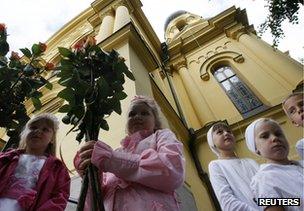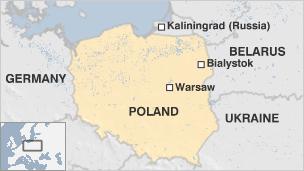Russian Patriarch Kirill makes historic visit to Poland
- Published
Patriarch Kirill was welcomed at Warsaw's Orthodox Cathedral
The head of Russia's Orthodox Church has been given a state welcome to Poland on a historic visit that may be overshadowed by the Pussy Riot trial.
Patriarch Kirill's four-day visit is seen as a breakthrough in efforts to reconcile the two countries, divided by politics and religion for centuries.
Poland has a small Orthodox community but is overwhelmingly Roman Catholic.
Kirill's stance on the punk group being tried over an obscene protest song in a Moscow cathedral is under scrutiny.
Verdicts in the trial are due on Friday.
Three of the musicians face imprisonment on charges of violating public order and inciting religious hatred, in a case which has sparked protests worldwide by musicians and human rights activists, who see their prosecution as being wildly disproportionate.
Sir Paul McCartney has written a letter of support to them.
"I would like you to know that I very much hope the Russian authorities would support the principle of free speech for all their citizens and not feel that they have to punish you for your protest," the former Beatle wrote.
'Brotherly and friendly'
Speaking after arriving by plane in Warsaw, Patriarch Kirill said: "It's a wonderful thing that the Christian faith dominates in both Russia and Poland and this provides us with common ground".

Orthodox Christian children turned out with flowers at the cathedral in Warsaw
Roman Catholic bishops and members of Warsaw's Orthodox Christian congregation crowded into the city's Orthodox Mary Magdalene Cathedral to welcome the patriarch.
The four-day visit is the culmination of three years of talks between the two churches, the BBC's Adam Easton reports from Warsaw.
Relations have been difficult, our correspondent adds. The Russian Orthodox Church has accused Roman Catholic priests of trying to poach believers in Russia and Ukraine.
Patriarch Kirill is closely identified with the Kremlin, having backed Vladimir Putin's re-election as president this year.
However, both churches are united in what they see as the need to defend Christian values in an increasingly secular Europe, our correspondent says.
On Friday Patriarch Kirill and the head of the Roman Catholic Church in Poland, Archbishop Jozef Michalik, will sign an unprecedented document urging mutual forgiveness for past errors.
"Our message is a call to the faithful and all who support soul-searching followed by a mutual asking for forgiveness," Archbishop Michalik was quoted as saying by AFP news agency.
Alexander Volkov, spokesman for the Russian Orthodox Church, said the "brotherly and friendly visit" would have no political overtones.
Stereotypes
Relations between the two countries have been soured by centuries of mistrust.

On the one hand, Poland was dominated by the USSR during the last century, and by the Russian Empire before World War I. On the other, Russians remember Poland's invasion in the early 17th Century and view with suspicion Warsaw's attempts to influence EU policy on Russia.
Patriarch Kirill will visit the north-eastern city of Bialystok, capital of the Podlasie region which is home to some 70% of Poland's 600,000 Orthodox Christians.
He will see the Suprasl Monastery, which houses an important museum of icons.
While the Polish Orthodox Church is an independent institution, links to its Russian counterpart are still strong and it is regarded with suspicion by many Polish Catholics, according to a report in France's Le Figaro.
Eugeniusz Czykwin, Poland's only Orthodox Christian MP, told the newspaper: "Stereotypes die hard.
"For most people, to be Polish is to be Catholic. Inversely, the Orthodox religion is automatically associated with Russia. As a result, Orthodox Poles have long been regarded as a Fifth Column."
Two women at Thursday's service in Warsaw, one Russian and the other Polish, told BBC News they were hopeful the visit would bring the nations closer.
"I hope it helps but of course our history is not so easy for many years and many different difficult situations but I think step by step we can make it better," said Olga, who is Russian.
Katarzyna, who is Polish, said: "I hope this visit makes relations better because Poland and Russia are neighbours. We should be friends, not fight each other."
- Published11 August 2012
- Published11 April 2012
- Published5 April 2012